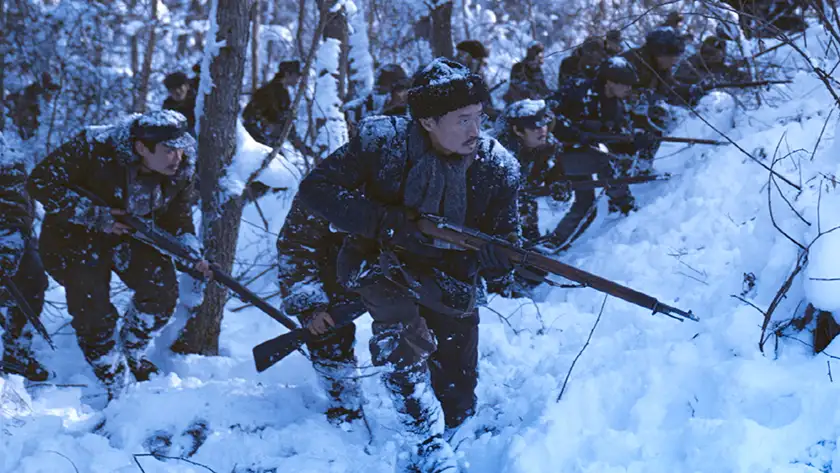Though straightforward in its presentation, Harbin displays a monumental piece of Korean history that’s worth the time investment.
Director: Min-ho Woo
Genre: Drama
Run Time: 108′
U.S. Release: January 3, 2025
U.K. Release: TBA
Where to Watch: In theaters
Woo Min-ho’s Harbin tells the story of Korean independence activists fighting to regain their country after Korea became a protectorate of Japan under the Eulsa Treaty of 1905. Among the resistance fighters was An Jung-geun (Hyun Bin), who would later assassinate the former prime minister of Japan, Itō Hirobumi.
The events of this historical Korean period are presented rather simply. Still, Harbin effectively highlights their significance and the steadfast commitment Korean activists took to try to regain their country’s independence. If, like me, you’re unfamiliar with what transpired between Korea and Japan during this time, at the very least, you’ll leave this viewing experience educated on what led to An Jung-geun’s decision to gun down Itō Hirobumi in October 1909.
What really sets the movie apart is Hong Kyung-pyo’s stunning cinematography work. From the moment Harbin starts, viewers are transported to an icy landscape where a wandering An Jung-geun is in solitude. The visual is breathtaking, yet there’s something undeniably bleak about the setting, given the vast space surrounding our protagonist. This moment visually symbolizes much of what An Jung-geun faces throughout the film, and how he feels somewhat alienated due to some of his choices.
Though the audience learns very little about An Jung-geun’s personal life, Bin does a fantastic job of reflecting the character’s unwavering dedication to his country and his inclination to see the best in people, even when it comes back to bite him. Bin shines most in his physical acting when depicting his character’s inner turmoil and the detrimental negative consequences that result due to his decisions. Similarly, other Korean independence fighters shown in the movie have little character development. However, it’s apparent that Harbin exists with the sole focus of emphasizing the significance of these events in Korean history.

Rather than building on each character’s backstory, director and writer Woo Min-ho, and co-writer Kim Min-seong want the audience to put themselves in each cast member’s shoes and experience the devastating loss of fallen fighters, the impact that the Eulsa Treaty had on Korea, and the prolonged and complex struggle the country faced to reclaim its independence.
Lee Dong-wook’s character, Lee Chang-seop, introduces significant tension with An Jung-geon. Chang-seop refuses to forgive our protagonist’s decisions, which impact the whole group and inadvertently put lives at risk. There’s also a mole amongst the pack that keeps the audience on edge, as we never quite know who it might be and are left trying to figure it out. But what elevates the movie most is Park Hoon’s standout depiction of Tatsuo Mori, whose screen presence is both magnetic and terrifying. Even in moments when the antagonist has little dialogue, his physical appearance amplifies the villain’s violent nature and coldness.
Harbin’s battle scenes are also incredibly well-choreographed and gripping to watch. Each minute of the bloodshed feels painfully realistic, and the impact and importance of the result increases the narrative’s intensity and stakes. The film’s score greatly enhances the emotions of each character and effectively conveys what the audience should be feeling throughout the viewing experience. It heightens the impact of gut-wrenching battle moments with fallen fighters while highlighting the impact of pivotal choices our leading man makes which will haunt him for the remainder of his life.
Though I understand why Harbin may be criticized for its straightforward story presentation and lack of character development, it’s a must-see period drama. The movie demonstrates Korea’s grueling fight for independence and the events of Korean activists who desperately tried to make it happen. Harbin is an important watch that is very much worth the time investment.
Harbin: Movie Plot & Recap
Synopsis:
Harbin tells the story of Korean Independence activist An Jung-geun and the events that led to his assassination of the former prime minister of Japan, Itō Hirobumi, in 1909.
Pros:
- Stunning cinematography, accompanied by an emotionally resonant score that amplifies the events depicted in the film
- Good performances, particularly Park Hoon, who is incredible as the movie’s villain.
- A straightforward presentation of the events that took place during this time period, which will educate those unfamiliar with the story
Cons:
- The characters lack development and some viewers may find it hard to emotionally connect with them
Harbin is now available to watch in US theatres.

